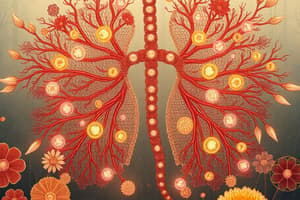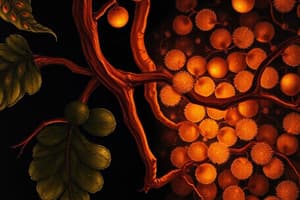Podcast
Questions and Answers
What is the primary purpose of respiration in organisms?
What is the primary purpose of respiration in organisms?
- To produce energy in the form of ATP (correct)
- To produce glucose for cellular function
- To eliminate carbon dioxide from the body
- To regulate body temperature
Which process occurs in the mitochondria as part of cellular respiration?
Which process occurs in the mitochondria as part of cellular respiration?
- Photosynthesis
- Krebs cycle (correct)
- Glycolysis
- Fermentation
What is the end product of aerobic respiration?
What is the end product of aerobic respiration?
- Lactic acid
- Carbon dioxide, water, and ATP (correct)
- Ethanol
- Pyruvate
Flashcards are hidden until you start studying
Study Notes
Respiration in Organisms
- The primary purpose of respiration in organisms is to generate energy for the body's various activities.
Cellular Respiration
- Cellular respiration is the process by which cells convert glucose into energy.
- It occurs in the mitochondria and involves the breakdown of glucose to produce ATP (adenosine triphosphate).
Aerobic Respiration
- Aerobic respiration is a type of cellular respiration that occurs in the presence of oxygen.
- The end product of aerobic respiration is ATP, water, and carbon dioxide.
Studying That Suits You
Use AI to generate personalized quizzes and flashcards to suit your learning preferences.




